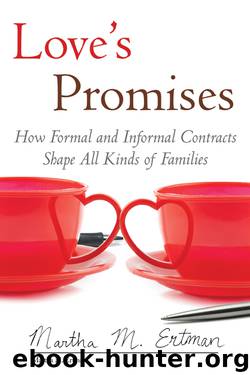Love's Promises by Martha M. Ertman

Author:Martha M. Ertman [Ertman, Martha M.]
Language: eng
Format: epub
ISBN: 978-0-8070-3367-8
Publisher: Penguin Random House LLC (Publisher Services)
Published: 2015-03-11T04:00:00+00:00
Pair-Bond Exchanges
Evolutionary biologists take a different route to the same conclusion. Viewing life through the lens of natural selection, they see exchange as a cornerstone to family and indeed, the human family.40 According to sociobiologists, our proto-human ancestors started an exchange that changed everything, providing the building blocks for both family and social organization.
Anthropologist Helen Fisher tells a vivid story of our hairy foremothers spending much of their days collecting roots and other vegetables while their male counterparts ranged over wider territory, hunting. Although their ancestors had mated freely, these proto-humans gradually formed what Fisher dubs “the most fundamental exchange the human race would ever make.”41 A female would focus her sexual and grooming attention on a male and share her foraged vegetables with him; he, in turn, would share his proceeds from the hunt. Whether these relationships lasted a few months, a year, or a lifetime, they were reciprocal. The female expected a share of the meat the male hunted, and he expected sexual access and a share of “her” vegetables. Gradually, Fisher contends, males also began to protect females from dangers, and over thousands of years, also began to help feed and protect the young. That exchange slowly transformed those children from “hers” into “theirs.” This account, if true, provides a genealogy of the pair-bond exchange.
E. O. Wilson, the father of sociobiology, contends that these male-female pair-bonds helped greatly in caring for completely helpless human babies and raising kids through the ten-plus years it takes humans to become self-sufficient. Pooling their resources was absolutely essential to get expensive-to-rear children to reproductive age so they could start the cycle again.42
Wilson also suggests that pair-bonding brought us society itself. Over millennia, he asserts, our distant ancestors extended these reciprocal exchange networks, first between families, then eventually—unlike other species—even between strangers.43 This last stage defines human society for Wilson:
Reciprocation among distantly related or unrelated individuals is the key to human society. The perfection of the social contract has broken the ancient vertebrate constraints imposed by rigid kin selection. Through the convention of reciprocation . . . human beings fashion long-remembered agreements upon which cultures and civilizations can be built.44
Download
This site does not store any files on its server. We only index and link to content provided by other sites. Please contact the content providers to delete copyright contents if any and email us, we'll remove relevant links or contents immediately.
The Social Psychology of Inequality by Unknown(3009)
The Plant Paradox by Dr. Steven R. Gundry M.D(2597)
The Writing on the Wall by Anselm Jappe(2030)
Working for Yourself by J.D. (Nolo) Stephen Fishman(1858)
Every Landlord's Legal Guide by Janet Portman & Stewart Marcia & Ralph Warner(1661)
The First 20 Hours: How to Learn Anything ... Fast by Kaufman Josh(1649)
Get What's Yours for Medicare by Philip Moeller(1641)
ADHD on Trial by Michael Gordon(1565)
Decisive by Chip Heath(1557)
Working for Yourself by Stephen Fishman J.D. (Nolo)(1517)
Drafting Contracts: How and Why Lawyers Do What They Do, Second Edition by Stark Tina L(1480)
Restitution by Restitution(1423)
A Practical Guide to International Arbitration in London by Hilary Heilbron(1422)
The Lord of the Rings: The Fellowship of the Ring, the Two Towers, the Return of the King by J. R. R. Tolkien(1421)
The Economist Aug 8th 2015 by The Economist(1409)
Intellectual Property Strategy by John Palfrey(1408)
The Economist Aug 29th 2015 by The Economist(1372)
Collusion by Luke Harding(1308)
Persuasion by Owner(1287)
